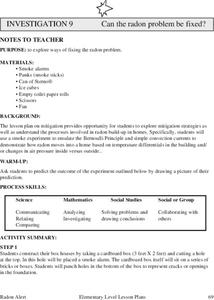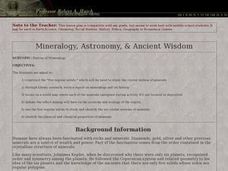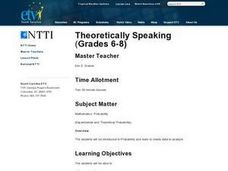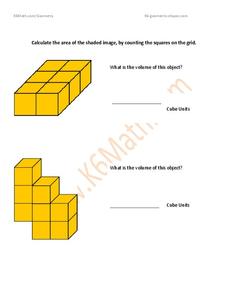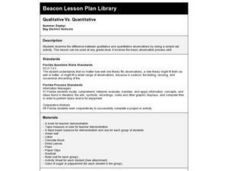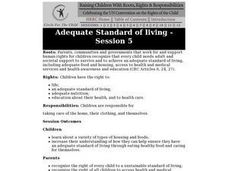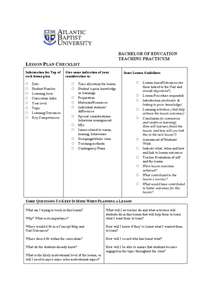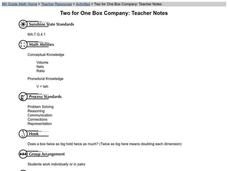Curated OER
Can The Radon Problem Be Fixed?
Students participate in lab activities in which they examine the radon level in homes. They demonstrate through convection currents how radon moves through a home based on temperature. They predict what they believe will occur during the...
Curated OER
Mineralogy, Astronomy, & Ancient Wisdom
Students complete a variety of activities surrounding minerals, crystals, and mineralogy. They locate common minerals on a world map, complete a lab in which they identify the chemical and physical properties of various minerals, etc.
Curated OER
Theoretically Speaking
Students define probability. They determine outcome from a given situation based on simple probability. Students create experimental data using a coin and a number cube. They write how theoretical and experimental probability are different.
Curated OER
The Air Up There
Learners engage in a lesson plan that is concerned with the average daily weather patterns. They collect data over a five day period and then write a summary of the observations made from it. Students record the mean and graph it on a...
Curated OER
Calculate Area Using Shaded Grids
In this area worksheet, students calculate area of shapes using shaded grids, writing answers in cube units. A reference web site is given for additional activities.
Curated OER
Anchoring Numbers to Five and Ten
Students complete activities to relate numbers to each other. In this number connection lesson, students count number sets, count forward and backward, and complete other number recognition activities to learn how numbers are related.
Curated OER
Patterns
Second graders create an ABAB pattern with their name. In this early elementary math lesson, 2nd graders first model their names in an ABAB pattern with unifix cubes. They then recreate the pattern using letter stamps on KidPix.
Curated OER
Math: Finding Surface Area
Eighth graders engage in hands-on activities to determine the surface areas of various objects. Using boxes, they cut them so they can lay flat and measure all the various shapes, which can be calculated and added together to equal the...
Curated OER
"th" numbers
Second graders practice the code in English for fraction is that the words end in "th." They write and solve problems involving halves, quarters, thirds and fifths as they realize that the meaning of fraction words one "x-th" is that it...
Curated OER
Richard's Dice
Students problem solve logic problems. They complete a worksheet using dice as a manipulative. They decide on a problem solving strategy, solve the problem, and write up the solution.
Curated OER
Capture the Circle (A Fraction Game)
Fourth graders compare and order fractions in a fraction game activity. In this fraction game instructional activity, 4th graders play a game that requires them to add fractions with like denominators and compare fractions. Students...
Curated OER
Qualitative Vs. Quantitative
Fourth graders examine the difference between qualitative and quantitative observations by doing a simple lab activity. This instructional activity can be used at any grade level. It involves the basic observation process skill.
Curated OER
Adequate Standard of Living: Children's Rights
Students and parents participate in a variety of activities designed to explore the issue of every person's right to adequate housing. They make butter, make models of different types of housing, read books, discuss the rights and...
Curated OER
Who Hid the Milk Products?
Students study milk products and learn their health benefits. In this milk products lesson, students discuss dairy products. Students participate in a game of milk product identification. Students also discuss categorizing milk by their...
Curated OER
Shakespear Scavenger Hunt
Learners use the internet to study basic biographical facts about Shakespeare in the form of an internet scavenger hunt. This activity is a great introduction to a Shakespearean unit of study.
Curated OER
Two for One Box Company
Here is a challenging and thought-provoking math worksheet. In it, learners work together to construct a variety of boxes of different sizes to see if doubling the size of a box really means it can hold twice as much stuff as the...
Curated OER
Candy Bar Math Fun!
Students practice math. In this measurement lesson, students measure their favorite candy bars to the nearest inch. They work independently to compare the different lengths of the candy bars they measure.
Curated OER
Rounding Decimals
Fourth graders engage in a lesson that is about the concept of rounding decimals. They review place value and focus it upon the practice of rounding. Students use 10 base decimal grids or models to help make connections with the skill.
Curated OER
Stuffed Animals Measuring
Learners measure stuffed animals with various materials such as dog biscuits, paper clips, and yarn. In this measurement lesson plan, students measure the stuffed animals, and understand the concept of long and short and big and little.
Curated OER
Mixtures
Students observe that movement of a solute in the solvent increases the rate of dissolution. They demonstrate that when the solute is broken into smaller pieces it dissolves faster.
Curated OER
The Lion, the Witch, and the Wardrobe: Vocab Squares
Creatively develop and reinforce new vocabulary from the book, The Lion, the Witch, and the Wardrobe by C.S. Lewis, using these vocabulary squares. Each square is divided into four quadrants asking scholars to input the word, a...
Curated OER
Two for One Box Company
Students draw a net (a two-dimensional pattern that can be formed to make a solid) for making an open top box on grid paper. They cut out the net and fold up each side to form the open box and tape the sides, then find the volume of the...
Curated OER
Two for One Box Company
Eighth graders experiment to decide if a box that is twice as big holds twice a much. They work the concept of volume and how changing dimensions affect it.
Curated OER
Olympics (Grade 4)
Students research information about the current Olympic research. For this Olympic research lesson, students take a pre-test to determine their knowledge about the current Summer Olympics. They choose one of three areas to research and...


